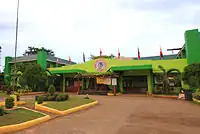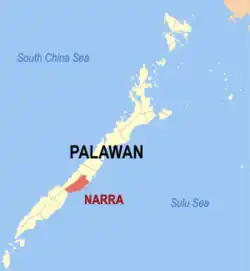Narra, Palawan
Narra, officially the Municipality of Narra (Tagalog: Bayan ng Narra), is a 1st class municipality in the province of Palawan, Philippines. According to the 2020 census, it has a population of 77,948 people.[3]
Narra | |
|---|---|
| Municipality of Narra | |
 Municipal Hall | |
 Flag | |
 Map of Palawan with Narra highlighted | |
.svg.png.webp) Narra Location within the Philippines | |
| Coordinates: 9°17′N 118°25′E | |
| Country | Philippines |
| Region | Mimaropa |
| Province | Palawan |
| District | 2nd district |
| Founded | June 21, 1969 |
| Barangays | 23 (see Barangays) |
| Government | |
| • Type | Sangguniang Bayan |
| • Mayor | Gerandy B. Danao |
| • Vice Mayor | Marcelino 'Jun' Calso, Jr. |
| • Representative | Jose Ch. Alvarez |
| • Municipal Council | Members |
| • Electorate | 46,022 voters (2022) |
| Area | |
| • Total | 831.73 km2 (321.13 sq mi) |
| Elevation | 21 m (69 ft) |
| Highest elevation | 368 m (1,207 ft) |
| Lowest elevation | 0 m (0 ft) |
| Population (2020 census)[3] | |
| • Total | 77,948 |
| • Density | 94/km2 (240/sq mi) |
| • Households | 19,513 |
| Economy | |
| • Income class | 1st municipal income class |
| • Poverty incidence | 10.34 |
| • Revenue | ₱ 403.5 million (2020) |
| • Assets | ₱ 1,142 million (2020) |
| • Expenditure | ₱ 310.9 million (2020) |
| • Liabilities | ₱ 469.3 million (2020) |
| Service provider | |
| • Electricity | Palawan Electric Cooperative (PALECO) |
| Time zone | UTC+8 (PST) |
| ZIP code | 5303 |
| PSGC | |
| IDD : area code | +63 (0)48 |
| Native languages | Palawano Tagalog |
Besides spelling out the local name for the Pterocarpus indicus—the Philippines' national tree—it is an acronym for National Resettlement Rehabilitation Administration. This program, established on June 18, 1954, resettled landless people from Luzon to Palawan. On June 21, 1969, the Municipality of Narra was created by virtue of Republic Act No. 5642 signed by President Ferdinand Marcos.[5]
Having a title as "The Rice Granary of Palawan" Municipality of Narra is the main rice producer of the Province of Palawan. The municipality also held "Palay Festival" (Formerly called as "Anihan(Reaping) Festival") held every middle or end week of the October.
Narra also includes Rasa Island, home of the endangered endemic cockatoo species called "Katala or Abukay or Kalangay (depends on local dialect)" or Philippine red-vented cockatoo (cacatua haematuropygia) and other rare animal species.
Geography
Barangays
Narra is politically subdivided into 23 barangays. Each barangay consists of puroks and some have sitios.
- Antipuluan
- Aramaywan
- Bagong Sikat
- Batang-batang
- Bato-bato (San Isidro)
- Burirao
- Caguisan
- Calategas
- Dumagueña
- Elvita
- Estrella Village
- Ipilan
- Malatgao
- Malinao
- Narra (Poblacion)
- Panacan
- Panacan 2
- Princess Urduja
- Sandoval
- Tacras
- Taritien
- Teresa
- Tinagong Dagat
Climate
| Climate data for Narra, Palawan | |||||||||||||
|---|---|---|---|---|---|---|---|---|---|---|---|---|---|
| Month | Jan | Feb | Mar | Apr | May | Jun | Jul | Aug | Sep | Oct | Nov | Dec | Year |
| Average high °C (°F) | 30 (86) |
30 (86) |
31 (88) |
31 (88) |
31 (88) |
30 (86) |
29 (84) |
29 (84) |
29 (84) |
29 (84) |
29 (84) |
29 (84) |
30 (86) |
| Average low °C (°F) | 24 (75) |
24 (75) |
24 (75) |
25 (77) |
25 (77) |
25 (77) |
25 (77) |
25 (77) |
25 (77) |
25 (77) |
25 (77) |
24 (75) |
25 (76) |
| Average precipitation mm (inches) | 85 (3.3) |
69 (2.7) |
100 (3.9) |
105 (4.1) |
202 (8.0) |
246 (9.7) |
241 (9.5) |
215 (8.5) |
236 (9.3) |
262 (10.3) |
231 (9.1) |
144 (5.7) |
2,136 (84.1) |
| Average rainy days | 15.6 | 13.3 | 17.5 | 19.9 | 27.4 | 28.1 | 29.4 | 28.6 | 28.6 | 28.8 | 26.4 | 21.0 | 284.6 |
| Source: Meteoblue[6] | |||||||||||||
Demographics
|
| ||||||||||||||||||||||||||||||||||||
| Source: Philippine Statistics Authority[7][8][9][10] | |||||||||||||||||||||||||||||||||||||
In the 2020 census, the population of Narra, Palawan, was 77,948 people,[3] with a density of 94 inhabitants per square kilometre or 240 inhabitants per square mile.
Economy
Gallery
 Estrella Falls
Estrella Falls Malatgao Beach
Malatgao Beach Fish Pond in Malatgao
Fish Pond in Malatgao Narra Municipal Hall
Narra Municipal Hall
References
- Municipality of Narra | (DILG)
- "2015 Census of Population, Report No. 3 – Population, Land Area, and Population Density" (PDF). Philippine Statistics Authority. Quezon City, Philippines. August 2016. ISSN 0117-1453. Archived (PDF) from the original on May 25, 2021. Retrieved July 16, 2021.
- Census of Population (2020). "Mimaropa". Total Population by Province, City, Municipality and Barangay. Philippine Statistics Authority. Retrieved 8 July 2021.
- "PSA Releases the 2018 Municipal and City Level Poverty Estimates". Philippine Statistics Authority. 15 December 2021. Retrieved 22 January 2022.
- "NARRA" (PDF). Provincial Government of Palawan. Archived from the original (PDF) on 4 March 2012. Retrieved 22 November 2012.
- "Narra: Average Temperatures and Rainfall". Meteoblue. Retrieved 17 November 2019.
- Census of Population (2015). "Region IV-B (Mimaropa)". Total Population by Province, City, Municipality and Barangay. Philippine Statistics Authority. Retrieved 20 June 2016.
- Census of Population and Housing (2010). "Region IV-B (Mimaropa)" (PDF). Total Population by Province, City, Municipality and Barangay. National Statistics Office. Retrieved 29 June 2016.
- Censuses of Population (1903–2007). "Region IV-B (Mimaropa)". Table 1. Population Enumerated in Various Censuses by Province/Highly Urbanized City: 1903 to 2007. National Statistics Office.
- "Province of Palawan". Municipality Population Data. Local Water Utilities Administration Research Division. Retrieved 17 December 2016.
- "Poverty incidence (PI):". Philippine Statistics Authority. Retrieved December 28, 2020.
- "Estimation of Local Poverty in the Philippines" (PDF). Philippine Statistics Authority. 29 November 2005.
- "2003 City and Municipal Level Poverty Estimates" (PDF). Philippine Statistics Authority. 23 March 2009.
- "City and Municipal Level Poverty Estimates; 2006 and 2009" (PDF). Philippine Statistics Authority. 3 August 2012.
- "2012 Municipal and City Level Poverty Estimates" (PDF). Philippine Statistics Authority. 31 May 2016.
- "Municipal and City Level Small Area Poverty Estimates; 2009, 2012 and 2015". Philippine Statistics Authority. 10 July 2019.
- "PSA Releases the 2018 Municipal and City Level Poverty Estimates". Philippine Statistics Authority. 15 December 2021. Retrieved 22 January 2022.